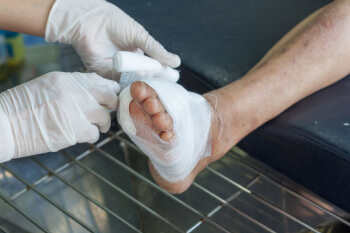 Foot pain is a common complaint that can arise from various causes, ranging from injuries and overuse to underlying medical conditions. One such condition that often manifests itself through foot discomfort is diabetes. Diabetes is a chronic metabolic disorder that affects the body's ability to regulate blood sugar levels. In this blog, we'll delve into the link between foot pain and diabetes, exploring why this connection exists and what individuals should be aware of when it comes to their foot health.
Foot pain is a common complaint that can arise from various causes, ranging from injuries and overuse to underlying medical conditions. One such condition that often manifests itself through foot discomfort is diabetes. Diabetes is a chronic metabolic disorder that affects the body's ability to regulate blood sugar levels. In this blog, we'll delve into the link between foot pain and diabetes, exploring why this connection exists and what individuals should be aware of when it comes to their foot health.
The Relationship Between Diabetes and Foot Pain: Diabetes can impact the nerves and blood vessels in the feet, leading to a condition known as diabetic neuropathy. Neuropathy refers to nerve damage, and in the context of diabetes, it can result in tingling, burning sensations, and pain in the extremities, particularly the feet. Additionally, diabetes can cause poor circulation, impairing the blood flow to the feet and contributing to a range of foot problems.
Common Foot Issues Associated with Diabetes:
Peripheral Neuropathy: As mentioned earlier, diabetes-related nerve damage can lead to peripheral neuropathy, causing pain, numbness, and tingling sensations in the feet.
Foot Ulcers: Poor circulation and nerve damage increase the risk of foot ulcers in individuals with diabetes. These ulcers can be slow to heal and may lead to serious complications if not properly managed.
Charcot Foot: This is a condition where the bones in the foot weaken and can eventually fracture, causing deformities. Diabetes-related neuropathy is a significant factor in the development of Charcot foot.
Infections: Diabetes can compromise the immune system, making individuals more susceptible to infections. Foot infections are particularly common due to factors such as poor circulation and nerve damage.
Prevention and Management:
Maintain Healthy Blood Sugar Levels: Keeping blood sugar levels within the target range is crucial for preventing or managing diabetes-related foot issues. Regular monitoring, medication adherence, and lifestyle modifications play key roles in achieving this.
Inspect Feet Regularly: Individuals with diabetes should inspect their feet daily for any cuts, bruises, blisters, or abnormalities. Prompt identification and treatment of minor issues can prevent them from escalating into more significant problems.
Choose Proper Footwear: Wearing comfortable, well-fitting shoes is essential for individuals with diabetes. Shoes should provide proper support and protection to prevent injuries.
Regular Check-ups: Regular visits to a podiatrist are crucial for individuals with diabetes. A podiatrist can assess foot health, identify any potential issues, and provide guidance on preventive measures.
While foot pain can result from various causes, it is important to recognize the potential link between foot discomfort and diabetes. Understanding this connection empowers individuals to take proactive steps in managing their diabetes, reducing the risk of complications and promoting overall foot health. If you are experiencing persistent foot pain, especially if you have diabetes, consult with a healthcare professional or podiatrist for a thorough assessment and personalized advice.
If you have any questions please feel free to contact our office located in Oradell, NJ. We offer the newest diagnostic and treatment technologies for all your foot and ankle needs.
